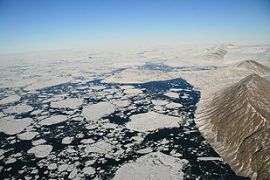Canada loses ancient ice shelf
Thousands-of-years-old ice shelf breaks away in northern Arctic.

“We went under cloud during our research and when the weather cleared up, all of a sudden there was no more ice shelf.”
He said: “It was a shocking event that underscores the rapidity of changes taking place in the Arctic.
“These changes are irreversible under the present climate.”
‘Terrible to see’
Warwick Vincent, a director of Laval University’s Centre for Northern Studies and a researcher in the programme ArcticNet, said that this region was experiencing “extremely rapid climate change consistent with what all the predictions say about global climate change”.
“It was a terrible thing to see … keeping in mind that these are features that have been around for what we think is more then three thousand years,” he added.
The summer’s ice shelf loss is equivalent to more than three times the area of Manhattan, Martin Jeffries of the US National Science Foundation and University of Alaska Fairbanks, has said in a statement.
Scientists reported in July that two large sections of ice detached itself from Ward Hunt ice shelf, the largest of the Ellesmere shelves.
The Serson shelf lost two sections totalling an estimated 122km and the break-up of the Ward Hunt has continued.
There are also reports of unusual cracks in a northern Greenland glacier and rapid melting of a southern Greenland glacier following a near-record loss for Arctic sea ice this summer.
“When we have lost these ice shelves, we have lost those really kind of unique, extreme, microbial environments that cannot be replaced,” Luke Copland, the director of the Laboratory for Cryospheric Research at the University of Ottawa, said.
Formed by accumulating snow and freezing melt-water, ice shelves are large platforms of thick, ancient sea ice that float on the ocean’s surface but are connected to land.
Ellesmere Island was once entirely ringed by a single enormous ice shelf that broke up in the early 1900s.
All that is left today are the four much smaller shelves.
Ecosystems ‘face extinction’
During the last century when ice shelves would break off, thick sea ice would eventually form in their place.
The loss of these ice shelves means that rare ecosystems that depend on them are on the brink of extinction, Vincent said.
Along with decimating ecosystems, drifting ice shelves and warmer temperatures that will cause further melting ice pose a hazard to populated shipping routes in the Arctic region, a phenomenon that was addressed by Stephen Harper, Canada’s prime minister.
Harper announced last week that he plans to expand exploration of the region’s known oil and mineral deposits, a move that has become possible as a result of melting sea ice.
Many scientists said it is the burning of oil and other fossil fuels that is the chief cause of manmade warming and melting ice.
Harper also said Canada would toughen reporting requirements for ships entering its waters in the Far North, where some territorial claims are disputed by the United States and other countries.